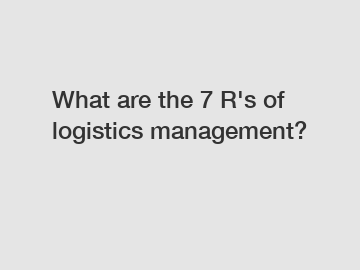What are the 7 R's of logistics management?
What Are the 7 R's of Logistics Management?
Logistics management plays a vital role in the success of any business that deals with the movement of goods and services. To ensure smooth operations, various principles and strategies are implemented. One of the widely recognized frameworks in logistics management is the 7 R's. These seven essential elements cover every aspect of the logistics process, from goods sourcing to final delivery. In this article, we will delve into the intricacies of the 7 R's and explore how they contribute to effective logistics management.
1. Right Product.

The first R in logistics management stands for the right product. It emphasizes the importance of sourcing and procuring products that align with the demands of customers. This aspect involves comprehensive market research, understanding consumer preferences, and selecting the most suitable products to meet their needs. By ensuring the right product is chosen, businesses can reduce inventory costs, prevent wastage, and increase customer satisfaction.
2. Right Quantity.
The second R pertains to the right quantity. It entails maintaining an optimal inventory level that strikes a balance between meeting customer demand and avoiding excessive stock. By accurately forecasting demand and monitoring inventory levels, businesses can prevent oversupply or stockouts. This, in turn, minimizes the associated costs, such as storage, carrying, and obsolescence.
3. Right Condition.
Ensuring the right condition of goods throughout the logistics process is crucial. Whether it's raw materials or finished products, proper handling, storage, and transportation are essential to maintain their quality and preserve their value. Businesses must invest in appropriate packaging, temperature control mechanisms, and robust quality control measures to prevent damage or spoilage. Paying attention to the right condition ensures customer satisfaction and minimizes product losses.
4. Right Place.
Getting the goods to the right place is another critical aspect of logistics management. Efficient transport networks, strategic location planning, and optimized routing ensure timely delivery of products to the intended destinations. This can be particularly important in global supply chains, where international trade and customs regulations come into play. By focusing on the right place, businesses can enhance customer service, reduce lead times, and gain a competitive edge.
5. Right Time.
The fifth R emphasizes the significance of timely delivery. In today's fast-paced world, customers have high expectations when it comes to receiving their orders promptly. Whether it's an e-commerce order or a manufacturing supply chain, delays can be costly. To meet these expectations, businesses need to streamline their operations, leverage technology, and implement efficient logistics strategies. By focusing on the right time, businesses can enhance customer satisfaction and loyalty.
6. Right Cost.
The right cost aspect of logistics management involves optimizing costs at every stage of the process. From procurement and transportation to warehousing and distribution, businesses need to find the right balance between cost and value. This can be achieved by negotiating favorable contracts with suppliers, employing cost-effective transportation methods, consolidating shipments, and implementing efficient inventory management practices. By focusing on the right cost, businesses can improve profitability and sustainability.
7. Right Documentation.
The final R pertains to the right documentation. Logistics operations involve a plethora of paperwork, including invoices, delivery receipts, customs documentation, and more. Accurate and well-maintained documentation is vital for legal compliance, ensuring smooth customs clearance, and reducing administrative errors. By prioritizing the right documentation, businesses can avoid delays, penalties, and costly disputes.
In conclusion, the 7 R's of logistics management encompass every crucial aspect necessary for effective supply chain operations. By focusing on choosing the right product, maintaining the right quantity and condition, delivering to the right place and time, optimizing costs, and prioritizing accurate documentation, businesses can streamline their logistics processes and gain a competitive advantage. Implementing these principles allows businesses to ensure customer satisfaction, reduce waste, and improve overall efficiency. So, if you're looking to optimize your logistics management, consider applying the 7 R's framework to drive success and growth.
For more Parcel distribution software expert, global parcel system cost, cloud-based Logistics Software for eCommerceinformation, please contact us. We will provide professional answers.

Comments